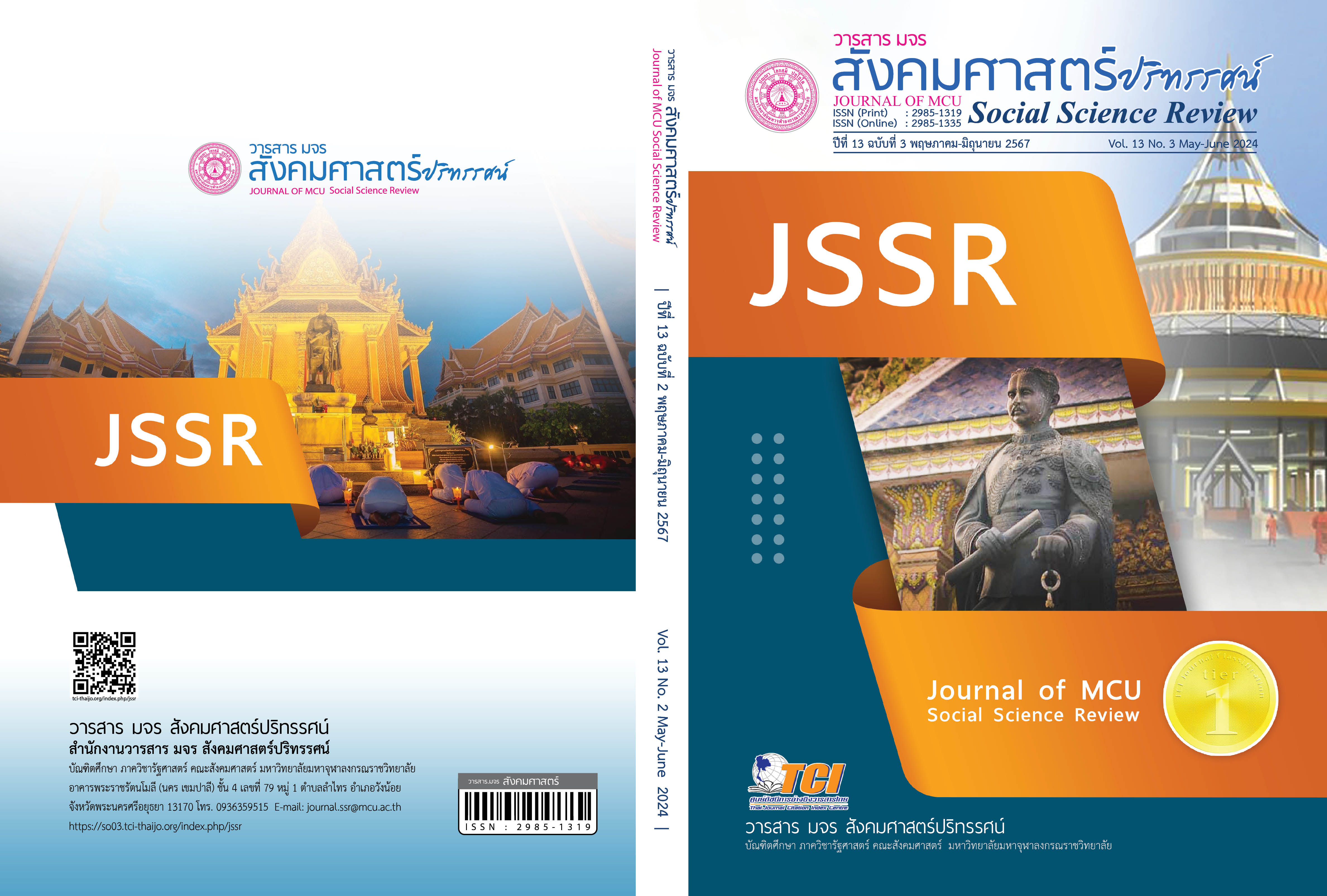การประยุกต์ใช้หลักมัชฌิมาปฏิปทากับการจัดการธุรกิจเพื่อสร้างความยั่งยืน
คำสำคัญ:
หลักมัชฌิมาปฏิปทา, การจัดการธุรกิจ, ความยั่งยืนบทคัดย่อ
แนวคิดการดำเนินธุรกิจอย่างมีคุณธรรมเป็นสิ่งที่องค์กรธุรกิจได้พยายามนำมาใช้ในการดำเนินงานเพื่อสร้างความยั่งยืนให้กับกิจการ หลักคุณธรรมที่นำมาใช้กับการจัดการธุรกิจ คือ หลักมัชฌิมาปฏิปทาได้แก่การประยุกต์ใช้สัมมาทิฎฐิ สัมมาสังกัปปะ สัมมาวาจา สัมมากัมมันตะ สัมมาอาชีวะ สัมมาสติ สัมมาวายามะ และสัมมาสมาธิ หลักมัชฌิมาปฏิปทากับการจัดการธุรกิจประกอบ ได้แก่ การจัดการผลิต ผู้ประกอบการมีสัมมาทิฏฐิมีความเห็นชอบว่าควรมีการปฏิบัติดี ไม่มุ่งร้ายต่อผู้บริโภค มีสัมมาสังกัปปะ คือมีความคิดที่ดีไม่คิดประทุษร้ายหรือคิดเอาเปรียบผู้อื่น ธุรกิจพึงผลิตสินค้าที่มีความปลอดภัยทั้งการออกแบบและการผลิต มีสัมมาวายามะกับผู้บริโภคมีความพยายามในการพัฒนากระบวนการผลิตให้มีประสิทธิภาพ การจัดการตลาด ผู้ประกอบการมีสัมมาวาจา มีการเจรจาที่ดีเป็นไปในทางสร้างสรรค์ไม่ก่อให้เกิดความเดือดร้อนแก่ผู้บริโภค มีสัมมากัมมันตะคือ ดำเนินงานด้านการตลาดอย่างมีคุณธรรม ไม่เบียดเบียนผู้อื่น มีการประพฤติปฏิบัติที่ดี มีความซื่อสัตย์ต่อผู้บริโภค ให้ข้อมูลข่าวสารที่เป็นจริง มีสัมมาวายามะในการปรับปรุงและพัฒนากระบวนการผลิตให้มีคุณภาพ การจัดการทรัพยากรมนุษย์ ผู้ประกอบการมีสัมมาสังกัปปะ มีความคิดที่ดีไม่มีอคติกับพนักงาน มีสัมมากัมมันตะ โดยมีการประพฤติปฏิบัติที่ดีมีคุณธรรมกับพนักงาน มีสัมมาวาจา โดยผู้ประกอบการพูดจาสุภาพกับพนักงาน และการจัดการการเงินผู้ประกอบการมีสัมมาอาชีวะ คือการวางแผนด้านการเงินให้มีความคุ้มค่าและเป็นประโยชน์สูงสุดแก่กิจการ มีสัมมาสติ คือ มีความรอบคอบและตั้งใจในการวางแผนการใช้เงินมีสัมมาวายามะคือมีความพยายามที่จะดำเนินงานเพื่อก่อให้เกิดรายได้แก่กิจการอยู่เสมอ
เอกสารอ้างอิง
ขวัญกมล ดอนขวา. (2556). การจัดการธุรกิจชุมชนบนพื้นฐานของปรัชญาเศรษฐกิจพอเพียง (รายงานการวิจัย). นครราชสีมา: มหาวิทยาลัยเทคโนโลยีสุรนารี.
จินตนา บุญบงการ. (2552). จริยธรรมทางธุรกิจ. กรุงเทพฯ: สำนักพิมพ์จุฬาลงกรณ์มหาวิทยาลัย.
ธนาคารกรุงเทพฯ จำกัด. (2560). กรณีศึกษาเรื่องธรรมาภิบาลกับบริษัท Enron. สืบค้น 4 พฤศจิกายน 2564, จาก www.ledge.bualuang.co.th
นันทิยา หุตานุวัฒน์ และณรงค์ หุตานุวัฒน์. (2552). การพัฒนาองค์กรชุมชน. กรุงเทพฯ: สถาบันพัฒนาองค์กรชุมชน.
ปิยะพันธ์ ทยานิธิ. (2562). วงจรความยั่งยืน. สืบค้น 20 มีนาคม 2565, จาก https://shorturl.asia/JQdS4
พระครูนิพัทธ์กัลยาณวัฒน์ (คะนอง กลฺยาณธมฺโม) และพระศรโสภณ ปภสฺสโร. (2562). พัฒนาการของการศึกษาที่ยั่งยืนตามแนวพุทธศาสตร์. วารสารบัณฑิตศึกษาปริทรรศน์ วิทยาลัยสงฆ์นครสวรรค์, 7(2), 297-316.
พระธรรมปิฎก (ป.อ. ปยุตโต). (2538). พุทธธรรม. กรุงเทพฯ: มหาวิทยาลัยมหาจุฬาลงกรณราชวิทยาลัย.
พระพรหมคุณาภรณ์ (ป.อ. ปยุตโต). (2552). พจนานุกรมพุทธศาสตร์ฉบับประมวลธรรม.กรุงเทพฯ: มูลนิธิการศึกษาเพื่อสันติภาพพระธรรมปิฎก.
มติชนออนไลน์. (2564). อย.เตือนอย่าหลงเชื่อโฆษณาผลิตภัณฑ์ Efferin อวดอ้างสรรพคุณเกินจริง สร้างเรื่องหลอกผู้บริโภค. สืบค้น 24 มกราคม 2565, จาก https://www.matichon.co.th/local/quality-life/news_2901847
วรัญญู เวียงอำพล. (2546). การจัดการการท่องเที่ยวแบบยั่งยืนในประทศไทย. กรุงเทพฯ: สถาบันบัณฑิตพัฒนบริหารศาสตร์.
ศิริวรรณ เสรีรัตน์. (2551). ความรู้เบื้องต้นเกี่ยวกับการประกอบธุรกิจ. กรุงเทพฯ: ดวงกมลสมัย.
ศูนย์คุณธรรม. (2552). โครงการศูนย์การเรียนรู้เศรษฐกิจชุมชนเชิงคุณธรรม จังหวัดเชียงใหม่. เชียงใหม่: สุเทพการพิมพ์.
ศูนย์บริหารสถานการณ์โควิด-19. (2564). รายงานผู้ติดเชื้อไวรัสโคโรน่า ปลายเดือนมีนาคม ถึง วันที่ 8 เมษายน 2564. สืบค้น 18 กันยายน 2564, จาก http://www.BBC.com
สหทัย โมสิกะ. (2557). คุณธรรมนำธุรกิจ. สืบค้น 5 พฤศจิกายน 2564, จาก www.posttoday.com
David, G. (2013). Policy: Sustainable development goals for people and planet. Retrieved September 22, 2021, from http://www.iied.org
Thai Union. (2012).Business Ethics. Retrieved September 21, 2022, from https://investor-th.thaiunion.com/
Velasquez, M. G. (2006). Business Ethics. New Jersey: Prentice-Hall.
ดาวน์โหลด
เผยแพร่แล้ว
รูปแบบการอ้างอิง
ฉบับ
ประเภทบทความ
สัญญาอนุญาต
ลิขสิทธิ์ (c) 2024 วารสาร มจร สังคมศาสตร์ปริทรรศน์

อนุญาตภายใต้เงื่อนไข Creative Commons Attribution-NonCommercial-NoDerivatives 4.0 International License.
เพื่อให้เป็นไปตามกฎหมายลิขสิทธิ์ ผู้นิพนธ์ทุกท่านต้องลงลายมือชื่อในแบบฟอร์มใบมอบลิขสิทธิ์บทความให้แก่วารสารฯ พร้อมกับบทความต้นฉบับที่ได้แก้ไขครั้งสุดท้าย นอกจากนี้ ผู้นิพนธ์ทุกท่านต้องยืนยันว่าบทความต้นฉบับที่ส่งมาตีพิมพ์นั้น ได้ส่งมาตีพิมพ์เฉพาะในวารสาร มจร สังคมศาสตร์ปริทรรศน์ เพียงแห่งเดียวเท่านั้น หากมีการใช้ภาพหรือตารางหรือเนื้อหาอื่นๆ ของผู้นิพนธ์อื่นที่ปรากฏในสิ่งตีพิมพ์อื่นมาแล้ว ผู้นิพนธ์ต้องขออนุญาตเจ้าของลิขสิทธิ์ก่อน พร้อมทั้งแสดงหนังสือที่ได้รับการยินยอมต่อบรรณาธิการ ก่อนที่บทความจะได้รับการตีพิมพ์ หากไม่เป็นไปตามข้อกำหนดเบื้องต้น ทางวารสารจะถอดบทความของท่านออกโดยไม่มีข้อยกเว้นใดๆ ทั้งสิ้น





